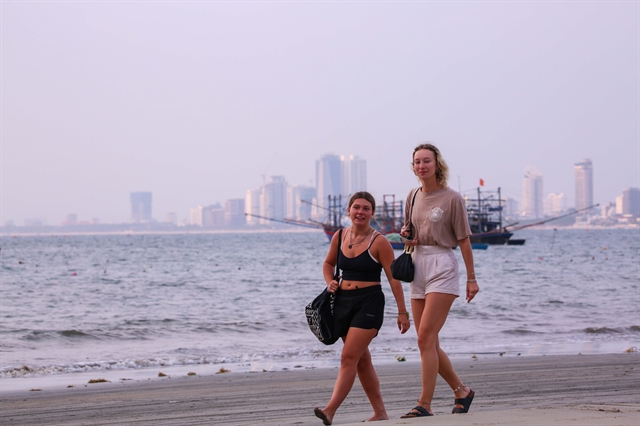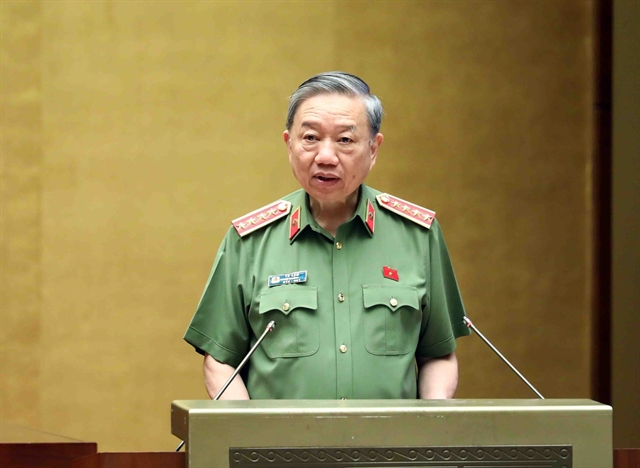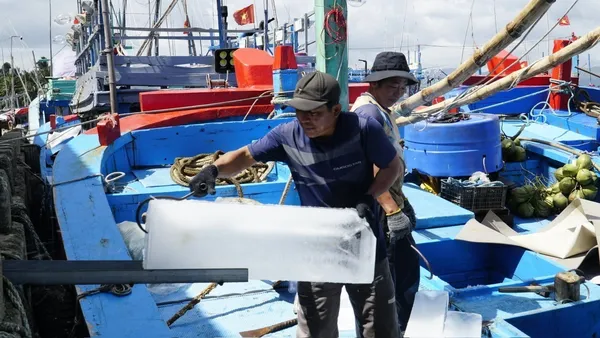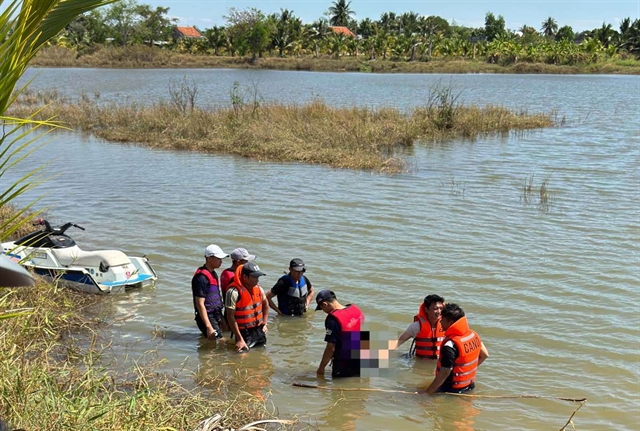 Politics & Law
Politics & Law


|
| Foreign tourists taking a walk on a beach in Đà Nẵng City. — VNA/VNS Photo Trần Lê Lâm |
HÀ NỘI — A bill to extend e-visas to 90 days and visa-free stays to 45 days has been submitted to the National Assembly for consideration on May 27.
Minister of Public Security Tô Lâm officially presented the draft amendments to the Law on Entry, Exit, Transit and Residence of Foreigners in Việt Nam and the Law on Entry and Exit of Vietnamese Citizens to the National Assembly for review.
The current laws were found to no longer meet the current demands and Party and State’s policies on turning tourism into a spearhead economic sector, Minister Lâm said at the ongoing fifth plenary session of the 15th-legislature.
He noted that Việt Nam’s foreign tourist arrivals in 2022 was only 32.6 per cent of the pre-pandemic figure, despite early reopening.
The Ministry of Public Security aimed to simplify procedures, promote administrative procedures on electronic platforms, create favourable conditions for Vietnamese citizens obtaining of entry and exit documents, as well as facilitate foreigners' entry, exit, transit, and residence in Việt Nam.
This would contribute to the development of the economy, tourism, and national security, as well as to the improvement of legal foundations and the effectiveness of State management in this area, Lâm said.
The draft law project consists of three articles – Article 1 amends 13 provisions of the Law on Entry and Exit of Vietnamese Citizens; Article 2 amends seven provisions of the Law on Entry, Exit, Transit, and Residence of Foreigners in Việt Nam; and Article 3 stipulates the effectiveness of enforcement.
Under the new proposed changes, the validity of e-visas will be extended from 30 days to 90 days (three months) for both single and multiple entries, and the number of countries and territories from which citizens will be eligible to apply for e-visas will be expanded (the list will be decided by the Government).
The temporary residence period will also be raised from 15 days to 45 days for citizens of countries unilaterally exempted from visas by Việt Nam, and for those whose visa applications or temporary residence extensions are being considered under other provisions of the law.
Regarding the residence of foreigners in Việt Nam, in order to ensure national security and social order, safety, the draft law also seeks to add in the responsibilities of accommodation providers as well as the obligation of foreigners to present their passports and valid residence documents in Việt Nam to the accommodation providers for temporary residence declaration in accordance with regulations.

|
| Minister of Public Security Tô Lâm presents the draft amendments to the Law on Entry, Exit, Transit and Residence of Foreigners in Việt Nam and the Law on Entry and Exit of Vietnamese Citizens to the National Assembly for review on Saturday. — VNA/VNS Photo |
Presenting the appraisal report on the draft amendments, Lê Tấn Tới, Chairman of the National Defence and Security Committee of the National Assembly, generally agreed on the necessity of amending and supplementing the laws with the political, legal, and practical grounds as presented in the Government's proposal.
The committee agreed with the proposal to extend the validity of temporary residence certificates at border gates for unilateral visa-exempted foreigners from 15 days to 45 days, which is in line with the current situation as the demand for long-term stays in Việt Nam increases, especially for foreigners who seek to invest in the country, work with agencies, businesses, other organizations, travel, or carry out other activities.
"The 45-day period is about the average duration that other countries in the region are implementing," Tới noted, adding that some NA deputies even suggested increasing the temporary residence period to a maximum of 60 days for more flexibility in the issuance of temporary residence certificates.
Some opinions suggested that Việt Nam's unilateral visa exemption policy with a limited validity for citizens of 25 countries was much lower than other countries in the region, so they proposed to expand the scope and conditions of unilateral visa exemption for citizens of various countries and territories, Tới said.
The proposed revisions are welcomed by industry insiders and foreign tourists alike, and they are expected to paint Việt Nam as a much more attractive destination amid fierce competition from other countries in the region.
Minister of Foreign Affairs Bùi Thanh Sơn at the discussions at the parliament backed the proposed changes, saying that the extension of duration of stay for foreign tourists would help to boost tourism industry and would be totally in line with the global trends.
According to the previous regulations, Vietnamese representative agencies abroad were only allowed to grant visas in special cases under the authorisation of the Immigration Department, but the scope was very limited and the procedures required the endorsement of the foreign affairs ministry of the host country, Sơn noted.
The Minister suggested that the amendment to the law this time needed to be more flexible and open as Việt Nam is expanding its international relations.
Minister Sơn also urged to waive the requirement for an invitation, reception, or a guarantor for foreign visitors entering Việt Nam for tourism or market research purposes.
"The issuance of electronic visas does not require a guarantor, but the requirement for a guarantor by Vietnamese representative agencies for visa issuance creates difficulties and may cause confusion for tourists," Sơn stated.
The Minister proposed to amend the regulations to allow Vietnamese representative agencies abroad to decide on granting visas for some necessary or urgent foreign affairs cases for humanitarian reasons, and the representative agencies will be responsible for visa issuance and inform the Immigration Department under the Ministry of Public Security. — VNS




